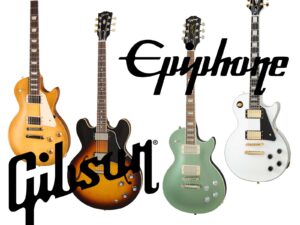The distinction between Epiphone and Gibson Les Paul guitars lies in a combination of factors that cater to different preferences and budgets. One primary difference between Epiphone and Gibson Les Pauls is the price point. Epiphone Les Pauls are generally more affordable than their Gibson counterparts, making them an attractive option for musicians seeking a quality instrument without breaking the bank. However, it’s crucial to note that this affordability doesn’t necessarily translate to inferior quality.
Epiphone and Gibson Les Paul are different
The question often arises, “Is Epiphone Les Paul the same as Gibson Les Paul?” While they share the same basic design and iconic Les Paul shape, there are notable differences in terms of materials, craftsmanship, and components. Gibson Les Pauls are crafted using higher-grade woods, more meticulous construction processes, and premium hardware, contributing to a superior overall build quality and tone.
The notion that “Epiphone is just a cheap Gibson” oversimplifies the relationship between the two brands. While Epiphone guitars are indeed more budget-friendly, they are not merely replicas. Epiphone has its own lineup of unique models and strives to provide players with affordable options that deliver excellent performance.
Can an Epiphone sound as good as a Gibson?
1Another common question is, “Can an Epiphone sound as good as a Gibson?” The answer depends on individual preferences and playing styles. While Gibson Les Pauls are renowned for their premium tone and craftsmanship, some players find that certain Epiphone models can deliver impressive sound quality, especially after modifications or upgrades. Ultimately, the tonal characteristics are subjective, and it’s worth exploring both brands to determine which suits your musical preferences.
For beginners entering the world of guitar playing, Epiphone is often considered a fantastic choice. The affordability of Epiphone Les Pauls makes them accessible to those just starting, allowing beginners to enjoy a reliable and playable instrument without a significant financial investment. As players advance and refine their skills, they may choose to explore higher-end models, possibly considering a Gibson Les Paul for its premium features and craftsmanship. In essence, both Epiphone and Gibson Les Pauls cater to a diverse range of players, offering options that align with varying preferences and budgets in the dynamic world of guitar playing.
Moreover, the relationship between Epiphone and Gibson is not solely hierarchical but rather collaborative. Epiphone Les Pauls often benefit from the research and development done by Gibson, incorporating some of the innovations and technologies found in their higher-end models. This synergy allows Epiphone to produce guitars that not only cater to budget-conscious players but also incorporate elements inspired by the craftsmanship and design philosophies of their Gibson counterparts.
While Gibson Les Pauls are associated with professional and experienced musicians, Epiphone Les Pauls have found favor among players of all levels. The affordability and versatility of Epiphone guitars make them an excellent starting point for beginners, providing a solid foundation for learning and experimentation. As players progress in skill and musicality, they may choose to explore the nuanced differences offered by Gibson Les Pauls, seeking the premium features and tonal nuances associated with the iconic brand.
The distinction between Epiphone and Gibson Les Paul guitars goes beyond a simple dichotomy of cheap versus expensive. It encompasses a spectrum of quality, craftsmanship, and price, offering a wide array of choices to cater to diverse musical tastes and financial considerations. Whether you are a beginner looking for an affordable entry point or an experienced musician seeking professional-grade instruments, both Epiphone and Gibson Les Pauls present compelling options within the rich tapestry of the guitar-playing experience.
FAQ

